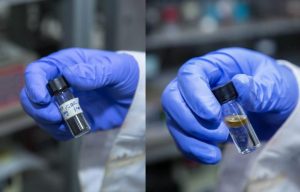A research team led by Professor Jae Sung Lee of Energy and Chemical Engineering at UNIST has discovered a new way to make biofuels directly from carbon dioxide. The team has produced road ready diesel through a direct CO2 conversion to liquid transportation fuels by reacting with renewable hydrogen generated through solar water splitting. The research was published in the journal Applied Catalysis B: Environmental.

The sample on the left is the new delafossite-based catalyst used in the reaction between CO2 and H2 generated by solar water splitting. Shown on the right is diesel, produced by the reaction.
According to Lee, traditional catalysts used for H2 with CO2 reactions mostly rely on low molecular weight substances such as methane or methanol. These low value catalysts provide low CO2 reduction effects. However, the research team has found the new delafossite-based catalyst composed of affordable copper and steel, converts CO2 into liquid hydrocarbon-based fuels (e.g., diesel fuel) in one single step. The resulting fuels can be used by trucks and buses with no modifications. The catalyst causes a reaction between CO2 emissions of industrial plants and H2 generated from solar hydrogen plant with diesel as the result.
“Diesel fuels have longer chain of carbon and hydrogen atoms, compared to mathanol and methane,” says Yo Han Choi, the first author of the research. “Using delafossite-CuFeO2 as the catalyst precursor, we can create longer carbon chains and this would allow for the production of diesel.”
 This direct CO2-FT synthesis, explains Yo Han Choi, is different from the German car maker Audi’s CO2-to-dielsel conversion process that involves two steps – reverse water gas shift (RWGS) reaction to CO followed by CO Fisher-Tropsch (FT) synthesis.
This direct CO2-FT synthesis, explains Yo Han Choi, is different from the German car maker Audi’s CO2-to-dielsel conversion process that involves two steps – reverse water gas shift (RWGS) reaction to CO followed by CO Fisher-Tropsch (FT) synthesis.
The researchers believe their new discovery holds the potential to revolutionize the auto industry in part due to its two major benefits: the process removes climate-change causing CO2 from the atmosphere and the resulting diesel/biofuel can be used an an alternative to petroleum-based transportation fuels.
Professor Lee adds, “We believe the new catalyst breaks through the limitation of CO2-based FT synthesis and will open the avenue for new opportunity for recycling CO2 into valuable fuels and chemicals.”

